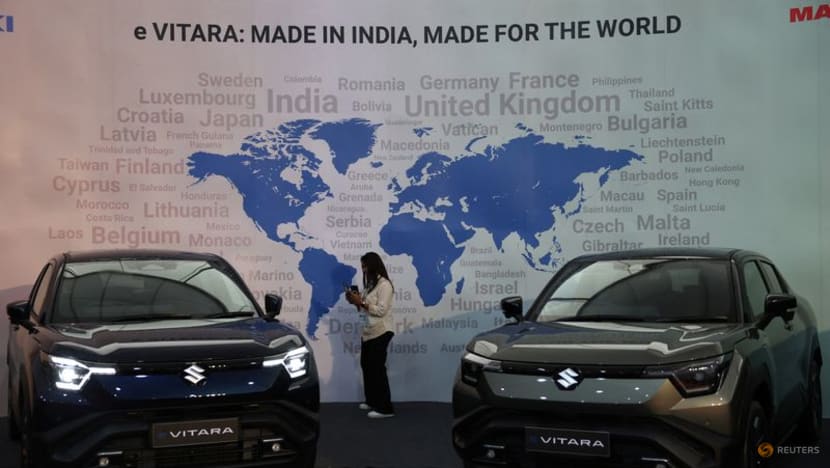Commentary: Will India’s and Pakistan’s EV bets pay off?
India and Pakistan require long-term investments and greater sensitivity to supply chain constraints for their EV sectors to take off, says Hannan Hussain of Initiate Futures.

A visitor uses her phone next to Maruti Suzuki's e Vitara SUV at the company's Gujarat plant in the village of Hansalpur Becharaji, India, Aug 26, 2025. REUTERS/Amit Dave

This audio is generated by an AI tool.
ISLAMABAD: India and Pakistan are rolling out the red carpet for electric vehicle (EV) manufacturers.
So far this year, India launched incentives such as reduced customs duties for foreign automakers to invest in India’s EV sector. Suzuki Motor pledged to invest 700 billion rupees (US$8 billion) in India, and to turn its Gujarat plant into the global production hub for its EVs. Vietnamese EV manufacturer VinFast established a US$500 million EV plant in Tamil Nadu, as part of a US$2 billion investment in India.
Meanwhile, a Pakistani tycoon has teamed up with China’s Cherry Automobile to invest US$100 million in building and marketing EVs in the country. Other Chinese EV makers are making inroads into Pakistan: BYD, for instance, will build an assembly plant and launch three EV models by 2026.
Both India and Pakistan are aiming for EVs to account for 30 per cent of auto sales by 2030. But the real question is: Will their EV bets pay off?
To make credible progress, both countries will require long-term investments in EV-focused skills development, greater sensitivity to supply chain constraints, and an indigenous battery recycling framework based on international best practices.
INDIA’S NEED FOR EXPERTISE
India has been pushing for EVs as part of its target for net-zero emissions by 2070. However, that promise is undermined by China limiting exports of rare earth minerals, which are a critical component for making EV motors.
Recent actions taken by New Delhi may prove counter-productive to its EV ambitions. The 2020 China-India border clash in the Himalayas sank bilateral ties to new lows, prompting both sides to impose travel restrictions and limit the issuance of work visas. India tightened its scrutiny of Chinese EV investments in the country – it rejected a US$1 billion investment offer from BYD in 2023.
However, tensions between China and India are thawing since the US imposed a 50 per cent tariff on goods from India. The move threatens to hurt scores of Indian exporters and risks thousands of jobs. These factors may push New Delhi to court Chinese investment in its EV sector.
India lacks industry-ready local labour for EV manufacturing, but auto workers possess complementary skillsets. Upskilling and re-education in the automotive industry are key for India to prevent job losses during the planned EV transition.
PAKISTAN’S RARE EARTH DEPOSITS
Meanwhile, Pakistan needs to focus on supply chain integration to grow its EV sector. It relies heavily on imports of critical EV manufacturing materials, potentially straining the country’s modest foreign exchange reserves.
Pakistan has untapped deposits of rare earth minerals such as copper, gold and lithium. It could secure investments from stakeholders in the United States and the Middle East, to cultivate expertise in alloy development, plant production and refining technology.
Pakistan can use existing dialogue mechanisms such as the Shanghai Cooperation Organization (SCO) to gain a deeper understanding of EV supply chains and how to leverage them. Cooperation on EV manufacturing is on the SCO’s agenda, and several SCO states in Central Asia have implemented measures to encourage mineral exploration and production.
BATTERY RECYCLING
Battery recycling is another consideration for both India and Pakistan, because it will enable them to ensure a steady source of materials essential for the development of lithium-ion and next-generation EV batteries. Given the heavy upfront costs involved in the process, India and Pakistan are well-advised to prioritise recycling at a time when foreign automakers are keen to invest.
Pakistan’s reliance on EV battery imports will inhibit its goal to ramp up EV manufacturing, underscoring the need for an early battery recycling framework. While Pakistan is still many years off its EV growth targets, it is important that it assures EV investors that the framework can be translated into a battery recycling ecosystem in due course.
India appears to be weathering this challenge more effectively. From brands such as Mahindra to Ather Energy, EV model manufacturing has seen an uptick, with battery manufacturing start-ups complementing the surge. Real-time recycling will ensure that top brands have short waiting periods in mass production, sparing countries the costs of depending on EV supply chains to plug raw material shortages.
Growing interest by Chinese EV makers, including BYD, suggests that the moment is right to communicate regulatory certainty to international investors. "We do not foresee excess capacity in our system as demand in Pakistan will catch up," said Danish Khaliq, vice president of sales and strategy at BYD Pakistan in a July news report.
Ultimately, India and Pakistan’s EV bets are advantageous prospects if the necessary groundwork is laid early. By giving EV-focused skills, supply chain management and domestic raw material growth due recognition, both South Asian neighbours can advance their EV ambitions.
Hannan Hussain is Senior Expert at Initiate Futures, a think tank based in Islamabad, Pakistan.


















